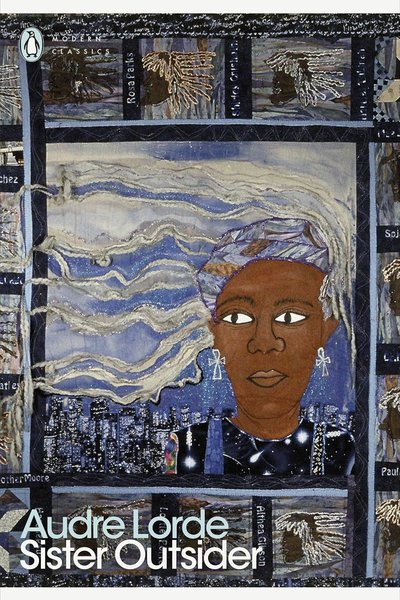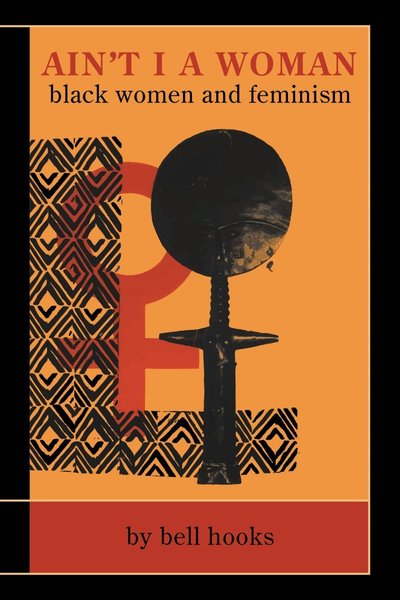Sister Outsider: Essays and Speeches
A foundational work of intersectional feminist theory. Through fifteen essays and speeches, Lorde explores the intersectional oppression of race, gender, class, and sexuality, creating a revolutionary theoretical framework for understanding multiple identities.

📝 Book Review
In the brilliant constellation of 20th-century feminist theory, Audre Lorde’s “Sister Outsider: Essays and Speeches” shines as the most unique and radiant star, illuminating the developmental path of intersectional feminist theory through its profound theoretical insights and revolutionary intellectual contributions. This collection of fifteen of Lorde’s most influential essays and speeches from 1976-1984 not only provides us with a groundbreaking framework for understanding multiple identities and intersectional oppression but also establishes an unshakeable foundation for contemporary feminist theory development through the poet’s sensitivity and theorist’s rigor.
Lorde’s life itself serves as a living textbook on multiple identity formation and intersectional oppression. Born in 1934 and passing in 1992, throughout her brief but rich life, she simultaneously carried multiple identity markers: Black, woman, lesbian, mother, poet, and theorist. This complex positioning allowed her to observe and analyze social reality from unique perspectives, developing theoretically revolutionary frameworks. As a poet, she published multiple collections and was recognized as one of the most important American poets of the 20th century; as a social activist, she actively participated in civil rights, feminist, and anti-racist movements; as a theorist, she articulated profound frameworks about multiple oppression before intersectionality was formally named.
Pioneering Intersectionality Theory
One of Lorde’s most important theoretical contributions is her status as a pioneer of intersectionality theory. Although the term “intersectionality” wasn’t formally introduced by Kimberlé Crenshaw until 1989, Lorde had already articulated the core content of this theoretical framework years earlier. She keenly observed that individuals always simultaneously carry multiple identity markers, and these identities are not simply additive relationships but complex networks that interweave and influence each other.
She deeply analyzed how different forms of oppression interact and reinforce each other, insisting that we must adopt holistic perspectives to understand oppression, opposing the compartmentalized treatment of race, gender, class, sexuality, and other forms of oppression. More importantly, she consistently grounded theoretical construction in personal experience, connecting abstract theory with concrete lived experience.
Lorde’s revolutionary redefinition of the concept of “difference” represents perhaps the most innovative aspect of her theoretical contribution. In traditional political discourse, difference is often viewed as weakness, a source of division, or an obstacle to overcome. However, Lorde completely overturned this understanding, transforming difference into a source of strength. She argued for difference’s fundamental importance to liberation politics, proposing that we must build genuine solidarity based on acknowledging and respecting difference.
In her theoretical framework, difference is not the enemy of solidarity but an important driver of innovation and transformation, an indispensable force for social progress. This perspective not only provides marginalized groups with new sources of power but also infuses the entire social justice movement with new vitality and hope.
Critical Essays Analysis
In this collection, “The Master’s Tools Will Never Dismantle the Master’s House” - the title itself has become a classic phrase in feminist theory, its underlying profound thought continuing to inspire theorists and social activists today. In this essay, Lorde presents a revolutionary viewpoint: using the oppressor’s methods and tools can never achieve true liberation.
This argument appears simple but actually touches the core of liberation politics. With keen insight, she provides sharp critique of exclusionary academic practices, questioning the reasonableness and effectiveness of traditional academic research methods. She points out that when we try to seek change within existing power structures, we are actually reinforcing these structures themselves. True transformation requires us to develop entirely new methods and tools, creating inclusive knowledge production approaches.
Another equally groundbreaking essay is “Uses of the Erotic,” where Lorde provides unprecedented in-depth analysis of female eroticism and power relations. Her redefinition of the erotic concept represents an important turning point in feminist theory history. In Lorde’s theoretical framework, the erotic is no longer a dangerous force needing suppression or control, but an important source of women’s inner power.
She closely connects the erotic with creativity and self-realization, arguing for its positive role in personal growth and social transformation. More importantly, she links personal eroticism with political liberation, proposing a unique body politics. In her view, suppression of the erotic is not merely a personal issue but an important mechanism of political control.
In “Poetry Is Not a Luxury,” Lorde demonstrates her dual identity advantages as both poet and theorist. She deeply contemplates poetry and literature’s political nature, arguing for poetry’s important value as a tool for political expression and resistance. In her analysis, language is never neutral but an important carrier and manifestation of power relations.
She particularly focuses on silence’s violent nature, pointing out that silence is often a form of oppression, while expressing one’s experience holds profound political significance. This politicized understanding of language and expression provided important inspiration for later postcolonial theory and cultural studies.
Black Feminist Theory Contributions
Lorde’s contributions to Black feminist theory development are groundbreaking. She laid important foundations for this theoretical field, proposing the famous “triple oppression theory,” analyzing in depth how racial, gender, and class oppression simultaneously operate on Black women’s lived experiences. She focused not only on oppression mechanisms but more importantly explored resistance strategies.
In her theoretical framework, cultural practices become important ways of resisting oppression, while establishing supportive communities in oppressive environments becomes the key strategy for achieving movement from survival to flourishing. Throughout feminist movement history, Lorde played an irreplaceable role in securing discourse rights for Black women.
She sharply criticized mainstream feminism’s marginalizing practices, insisting on establishing the legitimacy of Black women’s experience, actively fighting for Black women’s participation rights in knowledge production. More importantly, through her theoretical contributions, she proved that marginalized groups possess equally powerful theoretical creative capacity, opening new paths for later theoretical development.
Queer Theory Foundations
As a pioneer of queer theory, Lorde conducted deep theoretical exploration of homosexual identity. She keenly analyzed the complex intersectional relationships between sexual orientation and other identity markers, actively promoting political struggles for homosexual visibility. She redefined the political significance of intimate relationships, working to establish support networks for homosexuals.
Simultaneously, she conducted systematic critique of heterosexual institutions, understanding heterosexuality as a social institution requiring questioning. She deconstructed traditional gender roles, questioned the reasonableness of nuclear family models, and actively explored different intimate relationship patterns. These insights provided important theoretical foundations for later queer theory development.
Methodological Innovation
Lorde pioneered a unique method combining personal narrative with theoretical construction, using personal experience as the foundation for theoretical building while not stopping at personalized narrative. In her theoretical framework, knowledge is positional and situational; there is no abstract knowledge divorced from specific historical and social conditions.
She successfully transcended the binary opposition of subjective versus objective, emphasizing the epistemological value of bodily experience, providing important insights for later feminist epistemology development. More uniquely, Lorde achieved organic combination of literary creation and political analysis.
As an outstanding poet, she skillfully applied poetic thinking to theoretical construction, demonstrating metaphor’s important role in conceptual building. Her writing style embodies the unity of emotion and reason, proving that artistic practice holds profound political significance. This cross-boundary innovative method not only enriched feminist theory’s expressive forms but also provided new perspectives for understanding relationships between theory and practice, art and politics.
Contemporary Relevance and Ongoing Influence
Lorde’s theoretical work profoundly influenced subsequent feminist and social theory development. Her thought provided important foundation for Kimberlé Crenshaw’s later formal proposal of intersectionality theory, and her pioneering multiple identity analysis methods provided important inspiration for later researchers. More importantly, her work not only remained at the theoretical level but also provided important guidance for intersectional political practice, promoting the academic institutionalization process of intersectionality research.
In queer theory’s developmental process, Lorde’s contributions are equally indispensable. Her critique and reconstruction work on identity categories influenced Judith Butler’s later gender performativity theory, her thoughts inspired the development of queer of color theory, and her challenges to gender and sexuality norms laid foundations for later anti-normalization theory. Without Lorde’s pioneering work, contemporary queer theory’s developmental trajectory would be vastly different.
In contemporary academia, “Sister Outsider” has achieved classic literature status, becoming required reading for multiple disciplines including women’s studies, racial studies, queer studies, and literary studies, widely entering university curriculum systems. It not only influenced the establishment of subsequent research paradigms but also maintains ongoing dialogue with contemporary theory, continuing to inspire new generations of scholars and researchers.
Political and Social Movement Significance
For contemporary social movements, Lorde’s theory holds important guiding value. Her coalition politics thought provides important frameworks for alliance building between different groups, her identity politics analysis provides theoretical foundations for contemporary identity political movements, her multiple resistance strategies inspire various social movement developments, and her thinking about community organization provides valuable guidance for marginalized group organizational building.
Among Lorde’s rich theoretical legacy, several statements flash like lightning through the night of thought, becoming classic maxims repeatedly quoted and deeply contemplated by later feminists. Most famous is her revolutionary assertion in “The Master’s Tools Will Never Dismantle the Master’s House”: “The master’s tools will never dismantle the master’s house. They may allow us temporarily to beat him at his own game, but they will never enable us to bring about genuine change.”
This statement crystallizes her profound insight into liberation politics’ fundamental nature, reminding us that true transformation must begin with methodological innovation, not settling for minor adjustments within existing frameworks. Equally profound is her unique understanding of women’s inner power in “Uses of the Erotic”: “The erotic is a measure between the beginnings of our sense of self and the chaos of our strongest feelings. It is an internal sense of satisfaction to which, once we have experienced it, we know we can aspire.”
This definition completely overturns traditional negative perceptions of the erotic, repositioning it as an important tool for women to understand and change the world. In “The Transformation of Difference,” her important viewpoint about difference politics established theoretical foundations for pluralistic solidarity politics: “We do not have to become copies of each other to be able to work together. But we do have to recognize each other, our differences as well as the sameness of our goals.”
These words are not merely theoretical statements but action guides, pointing countless theorists and social activists forward on the path of pursuing justice.
Educational and Research Impact
“Sister Outsider” demonstrates remarkable interdisciplinary value and profound methodological influence in contemporary academic education and research. As a classic text of feminist theory, it provides indispensable theoretical foundations for women’s studies, with its profound insights and innovative analytical frameworks becoming required content for scholars and students in this field.
In racial studies, Lorde’s pioneering contributions to intersectional analysis of race and gender provide important case studies and methodological guidance for subsequent researchers, demonstrating how to conduct detailed and deep academic analysis within complex identity formations. “Sister Outsider” holds foundational significance for queer studies development, establishing solid theoretical foundations for this relatively young disciplinary field.
In literary studies, Lorde’s dual identity as poet and theorist makes this work a precious resource for poetic theory and literary criticism, providing literary researchers with unique perspectives combining creation and criticism. More importantly, Lorde’s methodological innovations brought revolutionary inspiration to entire humanities and social science research.
She pioneered autobiographical theoretical writing methods, organically combining personal experience with theoretical construction, breaking rigid boundaries between subjective and objective in academic writing. Her method of using multiple perspectives to analyze multiple identity formations provides effective tools for researchers handling complex identity issues.
Her writing style skillfully combining critical thinking with narrative strategies proves that academic rigor and readability are not mutually exclusive. Most importantly, her consistently maintained action-oriented research approach keeps theory and social practice closely connected, providing important theoretical support for participatory research and action research.
Conclusion: Lasting Legacy of Intersectional Thought
“Sister Outsider” stands as a milestone work in feminist theory history, not only laying important foundations for intersectionality theory development but also providing profound insights for understanding multiple identities, power relations, and liberation politics. Lorde’s theoretical contributions transcend their specific historical context, maintaining important guiding significance and inspirational value in today’s globalized, pluralistic world.
Through her revolutionary theoretical framework and passionate commitment to justice, Lorde demonstrated how marginalized voices can create knowledge that transforms broader political understanding. Her insistence that “the master’s tools will never dismantle the master’s house” continues to challenge activists and scholars to develop new methods and frameworks for social change that embody the values they seek to create.
The enduring power of “Sister Outsider” lies in its demonstration that effective liberation politics must center the voices and experiences of those most marginalized by existing systems while building coalitions across difference. Lorde’s vision of difference as a source of creative power rather than division provides a blueprint for solidarity that honors complexity while working toward shared goals of justice and freedom.
Her integration of the personal and political, the poetic and theoretical, the emotional and analytical, offers a model for scholarship and activism that is both rigorous and transformative. In an era of increasing polarization and simplification, Lorde’s nuanced understanding of identity, power, and resistance provides essential tools for building more inclusive and effective movements for social change.
“Sister Outsider” ultimately argues for a feminism that is truly intersectional, truly inclusive, and truly transformative—one that recognizes the full complexity of human experience while never losing sight of the goal of liberation for all. Through her powerful voice and revolutionary vision, Audre Lorde created a work that continues to guide and inspire those working for justice, demonstrating that the margins can indeed become centers of transformative power and insight.
Discussion
读书讨论
分享您对这本书的感想和看法,与其他读者交流见解
加入讨论
分享您对这本书的感想和看法,与其他读者交流见解
加载评论中...
Book Info
Related Topics
🛒 Get This Book
 Buy on Amazon
Buy on Amazon Related Books
读书讨论
分享您对这本书的感想和看法,与其他读者交流见解
加入讨论
分享您对这本书的感想和看法,与其他读者交流见解
加载评论中...

